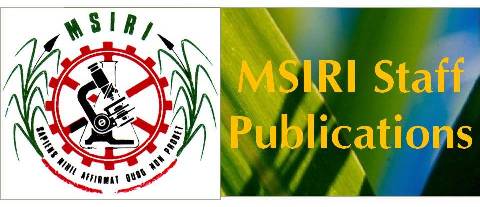Outsourcing research and development in sugar cane production to Mauritius
| MSI06P4191 | |
| Autrey, L. J. C. Ng Kee Kwong, R. | |
| Outsourcing research and development in sugar cane production to Mauritius | |
| Business Process Outsourcing and Modeling (BPOM): Competition and challenges with enhanced intelligent outsourcing, La Canelle Rouge, Domaine les Pailles, Mauritius, 24-25 February 2005 | |
| book chapter | |
| 2005 | |
| Conference paper (Conference organised by the University of Technology)(Abstract available at http://www.bpom.org/bpom2005.html) | |
| En | |
| En | |
| The assets of Mauritius to attract any outsourcing of research and development in sugar cane production are presented in this paper. Sugar cane has assumed a prominent role in the economy of Mauritius for nearly three centuries, accounting in the early 1970s more than 90per cent of the value of exports and 23 per cent of the Gross Domestic Product (GDP). Though at present sugar accounts for only 3 per cent of the GDP, it still represents 16per cent of the value of exports and sugar cane still occupies 92 per cent of the cultivated area or 45per cent of the island surface. The know-how acquired over three centuries in the production of sugar cane is unique. Indeed, despite the small size of the country (1 850 km2), there exists not less than 24 different climates where the mean annual rainfall changes abruptly from 800 mm on the west coast to over 4000 mm in the central tableland, over a distance of only 20 km. Our know-how in fact covers the sugar cane production potential not only over that many succession of climates but with the soil development having taken place on volcanic rocks over different geological ages, it stretches to as many as 13 different soil types. Furthermore, organized research on sugar cane in Mauritius began as early as 1893 well before the MSIRI itself was established in 1953. Research on sugar cane carried out even then was of the highest quality, e.g a variety M 134/32 was created occupying at one time not less than 92per cent of the cane area in Mauritius and large expanses in Réunion and Madagascar. Research and development in sugar cane has since covered all aspects of sugar cane production, from disease control to agronomic practices and to sugar manufacturing processes. More importantly the approach to research and development has been pragmatic and flexible, being influenced by the problems and challenges to the sugar cane industry and by the emergence of new technologies, such as biotechnology and information technology. With the depth and breadth of know-how acquired through more than one century of research and development in the many diverse environments and climatic conditions existing in Mauritius and the practical experience gained by cultivating sugar cane for more than three centuries, it should not be surprising that expertise has been provided by Mauritius to sugar industries throughout the world, in particular to not less than 20 African nations. This expertise has been wide ranging, from the eradication of diseases e.g Fiji disease in Madagascar, to evaluation of agronomic practices, to the restructuring of sugar industry itself and to capacity building/training. From this latter viewpoint, the Mauritius Sugar Industry Research Institute is an official centre offering tailor-made training to overseas scientists and in 1980 in a joint venture with the UNDP, it created a Regional Sugar Cane Training Centre for Africa (now known as Robert Antoine Sugar Industry Training Centre) to train staff from local and foreign sugar estates and factories, thus intensifying the foothold of Mauritius in Africa. From the foregoing, it is evident that in sugar cane production, Mauritius is no stranger to outsourcing and it is better positioned than most, if not all of the sugar cane producing countries, when outsourcing research and development in sugar cane production and associated activities is contemplated. | |
| research outsourcing capacity building expertise know-how technologies sugarcane | |
| Mauritius | |
| Agricultural research | |
| 2006-02-09 | |
| En | |
| Dir |
